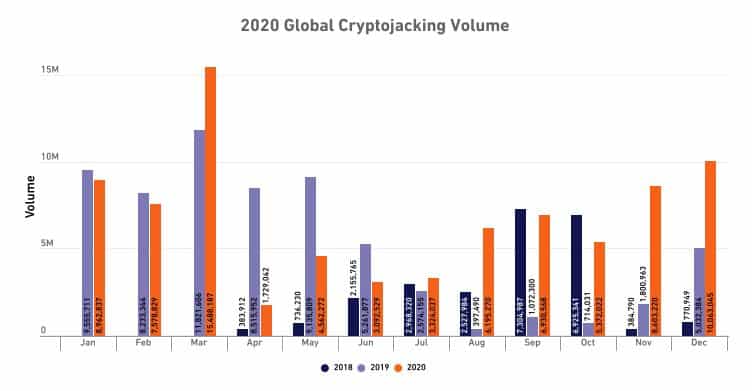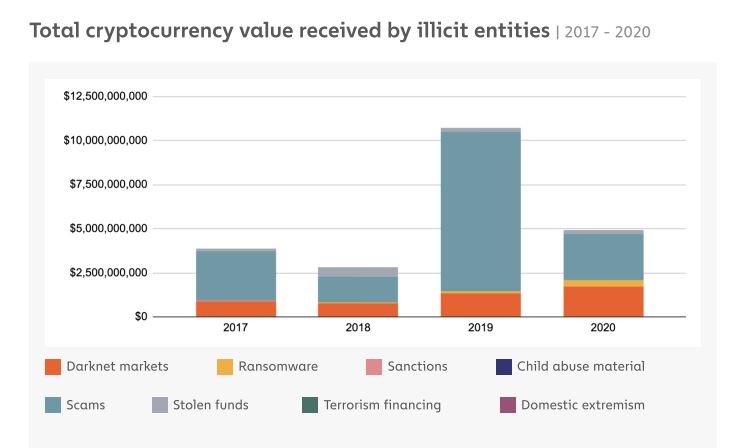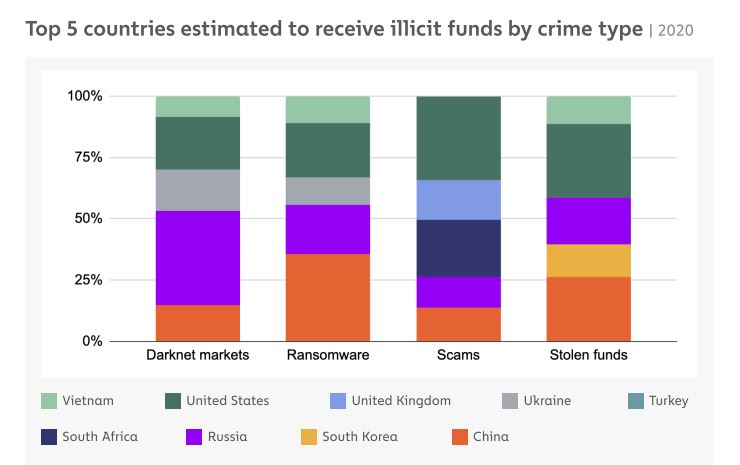
Bitcoin prices have increased dramatically over the past several months, so it’s no surprise that keeping bitcoin and other cryptocurrencies secure is top of mind. Since the development of bitcoin in 2009, we have seen an increase in the frequency of crimes involving cryptocurrencies. These range from simple Ponzi schemes to elaborate heists. And even if bitcoin owners think their stash is secure, some are their own worst enemies as they forget passwords or codes, blocking access to their funds.
Here, we delve into the most interesting statistics and trends surrounding cryptocurrency and bitcoin theft, fraud, and security based on the latest reports.
1. The biggest cryptocurrency heist to date was the 2018 Coincheck hack
We explored the biggest cryptocurrency hacks of all time and found that the largest heist was the Coincheck hack that took place in 2018. At the time, the amount stolen equated to around 58 billion Japanese yen (which was roughly $532 million USD).
2. Another huge hack was the Mt Gox exchange, which lost $470 million
At its peak, Mt Gox was responsible for 70 percent of bitcoin transactions. A hack took place gradually over several years but was not admitted until 2014. In total, around 850,000 bitcoins were stolen, and even though the value of bitcoin was relatively low, this haul was worth around $470 million at the time.
3. John McAfee and his bodyguard are accused in a $13 million fraud scheme
John McAfee (of antivirus fame) has made many headlines over the past several years. In one of the latest stories surrounding his activities, he and his bodyguard are accused of running a cryptocurrency “pump and dump” scheme which allegedly saw them swindle $13 million out of crypto investors.
Pump and dump schemes involve inflating the price of a stock by promoting it to investors, and then selling it off when the price is deemed high enough. The selloff results in the price of the stock dropping, causing major losses for investors.
4. Centra Tech co-founder Sam Sharma was handed an 8-year sentence for fraud
Centra Tech was involved in a large fraud scheme that saw the company rake in over $25 million, although at one point, these funds were worth over $60 million. Centra Tech purported to offer crypto-related financial products including a special debit card that was endorsed by several celebrities.
It transpired that the company had made false claims about its products and had even created a fake CEO. In March 2021, co-founder of the company, Sam Sharma, was sentenced to eight years in prison for his role in the scheme.
5. 2020 saw a 28% year-on-year increase in cryptojacking
Cryptojacking uses malware to mine bitcoin or other cryptocurrency on the victim’s device, and the attacker pockets the proceeds. It was predicted that the 2019 demise of Coinhive (then the largest crypto mining operation) would signal the death of cryptojacking. However, according to the 2021 SonicWall Cyber Threat Report, there was a significant year-on-year increase in global cryptojacking attacks in 2020.
Of note, March 2020 saw over 15 million attacks and year-on-year increases in August to December ranged from 100 percent (in December) to 1,400 percent (in August).

6. Cryptojacking rose 260% in North America in 2020
The SonicWall report breaks things down by region. One notable statistic is the increase in attacks in North America. The number of attacks rose by a whopping 280 percent. In Asia, there was a vastly different story as cryptojacking actually fell 87% percent.
7. 2020 cryptojacking attacks on healthcare rose almost 1,400%
SonicWall also looked at how cryptojacking affects different industries. Healthcare was hit hard by a number of threats in 2020 and indeed this industry saw the largest increase in cryptojacking attacks, with prevalence rising 1,391%.
8. £3.5 billion is at stake in lawsuits brought about by claimed bitcoin inventor Craig Wright
Craig Wright is a computer scientist who claims he is the inventor of bitcoin. In February 2021, Wright launched legal actions against the developers of several cryptocurrencies. Those legal actions could be worth a total of £3.5 billion. While the details of the actions are complex, essentially, Wright is taking action against developers over access to hacked addresses containing stolen bitcoin.
9. Police seized 581 bitcoin mining machines in a sting operation
Mining Bitcoin requires an immense amount of computing power and, therefore, electricity. In March 2021, a Malaysian police bust on a bitcoin mining syndicate resulted in the seizure of hundreds of mining machines. It’s reported that the syndicate was stealing electricity supply, leading police to raid nine premises in Bandar Enstek and Bandar Baru Nilai.
10. Cryptocurrency hacks and thefts increased almost 40% in 2020
According to research by Trading Platforms UK, cryptocurrency hacks and thefts in 2020 involved $513 million worth of bitcoin and other cryptocurrencies. This was up 38.38 percent compared to 2019. That said, the year with the highest figure was 2018 with $950 million worth of hacks and thefts.

11. Blockchain fraud and misappropriation was valued at almost $1.4 billion in 2020
The Trading Platforms UK report also noted that blockchain fraud and misappropriation declined significantly in 2020. 2019 was a huge year for these crimes and saw them valued at almost $4.5 billion. Still, the $1.387 billion observed in 2020 was no small sum and was almost double the 2018 amount of $750 million.
12. 5.6 million crypto storage apps were downloaded in the first month of 2021
With bitcoin seeing a resurgence in popularity in early 2021, it’s perhaps no surprise that this was accompanied by a sharp increase in the number of downloads of crypto storage apps. 5.6 million such apps were downloaded in January 2021 alone. To put this in perspective, 18.13 million of these apps were downloaded in the whole of 2020.

13. One fraudster robbed over 3,500 victims
According to reports, a Swedish man who pled guilty to wire fraud, securities fraud, and money laundering charges defrauded $16 million in cryptocurrency from at least 3,575 victims. Roger Mils-Jonas Karlsson was accused of using several aliases and conducting various fictitious echems, persuading victims to hand over funds in the form of cryptocurrencies.
14. Over 100 people were arrested in the PlusToken Ponzi scheme
The PlusToken cryptocurrency fraud ring originated in South Korea and was advertised as a high-yield investment, with claims of returns up to 18 percent per month. It’s believed the scammers withdrew over $3 billion worth from the accounts of investors in June 2019, prompting an international manhunt.
In July 2020, 109 people were arrested by Chinese authorities for their involvement in the scheme. November 2020 reports suggest that digital assets seized in the crackdown were worth over $4 billion. Top operators of the scam were jailed for up to 11 years in December 2020.
15. Scams are responsible for the majority of cryptocurrency received by illicit entities
According to the Chainalysis Crypto Crime 2021 Report, in 2020, around one percent of all cryptocurrency activity involved illicit entities. The report broke down what activities these illicit funds were involved in, with scams accounting for the majority. Darknet markets were also responsible for a significant amount, with ransomware and stolen funds accounting for smaller portions.

16. Bitcoin scam revenue peaked in August 2020
Bitcoin revenue from scams grew significantly during the first eight months of 2020 but declined during the last four months of the year. While scams made up a large portion of illicit funds, the portion did actually decrease compared to the previous year. This decline was attributed to the absence of the PlusToken scheme, which inflated 2019 figures.
17. Bitcoin scammers launder money through gambling platforms
As with fiat currencies, illicit entities launder bitcoin that’s involved in criminal activity. Chainalysis tells us that one of the most popular avenues for bitcoin laundering by scammers is through gambling sites.
18. Scammers are all over the world but concentrated in several countries
Of course, it’s nearly impossible to find out where some scams stem from, but Chainalysis estimates where various crimes originate by analyzing the web traffic of services that receive illicit funds. It found that the top country for cryptocurrency scams to emerge from was the US, followed by South Africa and the UK, with China and Russia rounding out the top five.

19. More than €3 million was stolen in the Ledger phishing scam
Phishing scams don’t make up a huge percentage of bitcoin scams, but the Ledger phishing scam was notable. Ledger provides hardware wallets, devices on which users store cryptocurrency. After user email addresses were leaked in a data breach (disclosed in July 2020), a subsequent October phishing scam targeted customers involved in the breach.
Emails sent to victims contained a link leading to a phishing site that looked like the legitimate Ledger website. In turn, the website contained a link that actually downloaded malware capable of draining the victim’s Ledger wallet. Chainalysis has identified more than €3 million worth of stolen funds related to the scheme.
20. Over half a billion dollars in cryptocurrency was stolen in 86 attacks in 2020
2020 saw far more cryptocurrency thefts than 2019 or 2018. 86 attacks were recorded in 2020, while the number was 24 in 2019 and around 16 in 2018. However, the number of attacks doesn’t tell the full story and 2018 was actually a far worse year in terms of the amount stolen ($1.2 billion compared to $500 million in 2020).
21. More than half of the 2020 haul was from the KuCoin hack
Chainalysis also notes that a significant portion of stolen funds often results from a single attack. Almost half of the amount stolen in 2018 was from the Coincheck hack and more than half of the 2020 amount resulted from the KuCoin hack.
22. Telegram was ordered to pay $1.2 billion to investors
Telegram’s 2018 ICO was met with skepticism from the get-go, and although there was no admission of wrongdoing, Telegram did end up having to pay investors over $1.2 billion in June 2020. At the same time, a civil penalty of $18.5 million was also imposed. Charges centered around the fact that Telegram did not register its early sale of “Grams” tokens worth $1.7 billion.
23. 20 percent of the existing bitcoin is considered lost
According to Chainalysis, 20 percent of the roughly 18.5 million bitcoin in existence has not moved from its respective addresses in five years or more. It considers this 3.7 million bitcoin (worth around $207 billion at the time of writing) as lost.

And that’s not too difficult to believe when you consider some of the stories circulating. For example, Stefan Thomas, a software developer who is heavily involved in the world of cryptocurrency, is missing a good chunk of coin. For years, he has been trying to figure out the password to his IronKey that holds 7,002 bitcoin (worth around $392 million).
Across the pond in the UK, IT worker James Howells has even tried digging up a landfill site to find his hard drive containing a digital wallet housing 7,500 bitcoins. He threw away the drive back in 2013 when the coins were essentially worthless.
L’article Bitcoin fraud, theft, and security statistics est apparu en premier sur Comparitech.
0 Commentaires